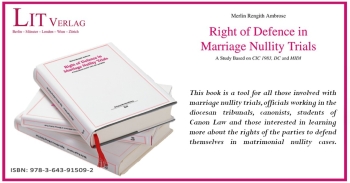
.jpg) Monsignor Francisco Vinaixa
Monsignor Francisco Vinaixa

The book ‘Right of Defence in Marriage Nullity Trials -- A Study Based on CIC 1983, DC and MIDI’ by Rev. Dr. Merlin Rengith Ambrose, Professor of Canon Law at St. Peter’s Pontifical Institute, Bangalore and Executive Secretary of Commission for Canon Law in the Conference of Catholic Bishops of India (CCBI), is a study of the special canonical processes for the declaration of nullity of marriage. It focuses on the right of defence that is always a central issue of any trial and procedural law. After years of diligent scientific research, the author was able to address it satisfactorily with reference to the special process of nullity of marriage.
The centrality of the problem is particularly relevant in these special processes. The raison d'être is to seek the truth about marriage with the guarantees necessary to arrive at it. Respect for the rights of the parties is mainly manifested in compliance with the right of defence. The result was an extraordinarily systematic and comprehensive work, and the index reflects the linearity of the exposition and breadth of subjects dealt with in detail.
The monograph illuminates the entire nullity process, and will undoubtedly be a valuable tool for those who want to deepen the procedural tools of these causes and act in this sphere of law with justice and in accordance with the truth. The work correctly identifies the legal institutions regarding the right of defence and one by one rigorously analyzes them. It contains a good exposition of the history of institutions, starting not only from the foundations of natural law and of Revelation but also from the elements of Roman law that were used to give their initial basic structure to these canonical processes. The subsequent developments of the initial procedural institutes are then explained with equal rigour by presenting the other procedural institutes which arose alongside those in the long two thousand years of the Church's history.
It seems right to ponder the wide knowledge of the jurisprudence of the Tribunal of the Roman Rota and the Supreme Tribunal of the Apostolic Signatura, which emerge throughout the book. It also reveals a great familiarity with the doctrine of some of the most renowned procedural canonists, with constant references to books and articles that give solidity to the positions held by the author. Although this may be obvious, it should also be added that the author manifests a good knowledge of canon law and the pontifical magisterium, always maintaining an attitude of respect, obedience, and veneration to the Successor of Peter proper to a Catholic priest as he is.
None of the fundamental topics relating to the right of defence of the parties and the marriage bond is left out. This detailed and rigorously updated analysis examines every theme relating to the right of defence in the Code of Canon Law, the Instruction Dignitas connubii, and Pope Francis’ Motu proprio Mitis Iudex Dominus Iesus. Moreover, it does not limit itself to pointing out problems, but it goes even further in proposing possible practical solutions, especially where the right of defence could conflict with other rights. Two of such rights, mentioned recurrently in the book, are the right to preserve the intimacy of the persons and their good reputation and that of others, and the right to obtain a final decision within a reasonable time.
In conclusion, I would like to say that it was an immense pleasure to read these pages. They bear witness to Rev. Dr. Merlin Rengith Ambrose’s editing and pedagogical skills. I am not referring here to what concerns the English language of which I have very basic knowledge, but rather to the author’s writing skills that allow for a smooth and fast reading of the text in spite of the complexity of the topics covered. As it happens, the subject matter is presented in an attractive and engaging manner. The text is very pedagogical as it succeeds in a subtle manner to repeat its key ideas by adding to them various aspects that further delineate them. In addition, the clarity with which the author writes makes it easy to understand. This is a work that will be, I believe, of great use to professionals in the ecclesiastical forum, but also meaningful for any person to whom the subject may be of interest.
Details of the book: Place of Publication, Publisher, and Year: Germany, LIT Verlag, 2022; Pages – 364; ISBN: 978-3-643-91509-2; Available at: https://www.lit-verlag.de/isbn/978-3-643-91509-2; Price: 40 Euros.
(The writer is an official of the Dicastery for Legislative Texts, Vatican)